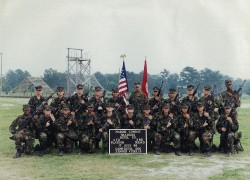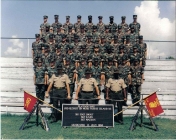A Field Artillery Meteorological Crewmember is a member of the Army's field artillery team. Artillery systems are weapons that fire large ammunition or missiles to support infantry and tank units in combat. The Field Meteorological Crewmember monitors weather conditions and patterns so artillery units can fire and launch missiles accurately.
13W1O - Skill Level One




FA Metro Crewmember: Assemble and operate computer and peripheral equipment. Remove and reprogram system software and firmware. Operate met and inflation equipment. Perform operator maintenance on electronic and manual meteorology equipment. Compute total and free balloon lift for helium and hydrogen. Emplaces meteorology and inflation equipment. Perform inflation, preflight, and post flight duties. Utilize basic meteorology knowledge to conduct and report limited observations of surface atmospheric conditions. Input upper air information into Computer Assisted Artillery Meteorology Models to develop Meteorology data. Prepare data and met messages for dissemination. Prepare and release balloon train. Monitor flight progress and system status during flight. Utilize voice and digital electronic communications systems. Operate power generation equipment. Operates vehicles.
13W2O - Skill Level Two

Metro Equipment Repairer: Supervises and performs unit level maintenance on electronic and manual meteorology equipment. Supervises the operations of the second shift during 24-hour operations. Verify data or met messages before dissemination. Analyze and repair computer and peripheral equipment malfunctions. Provides technical liaison to Direct Support and Depot equipment repair units. Verify calibration of electronic and manual meteorology equipment. Supervise inflation system emplacement and initialization. Select appropriate wind-finding mode and determine status and strength. Analyze operator fault diagnostics. Establish digital and voice communications, performs duties shown in preceding level of skill and provides technical guidance to subordinate personnel and maintenance personnel.
13W3O - Skill Level Three

FA Metro Section Chief: Serves as Team Chief. Performs detailed analysis of raw weather data to determine validity of computer output. Analyze non-standard atmospheric conditions and initiate appropriate actions. Verifies emplacement orientation data prior to first flight of the day. Supervises, inspects and test electrical grounding of all equipment prior to first flight of the day. Prepares technical and administrative reports covering met station activities. Analyzes and approves appropriate wind-finding chains or satellites. Examines samples of data for quality control. Supervise handling of chemical and explosive materials. Performs duties shown in preceding level of skill.
13W4O - Skill Level Four

Metro Station Leader: Supervises met operations. Develops meteorology plans to support local and Staff Weather Office requirements. Analyzes weather data for significant changes affecting meteorology observations and soundings. Coordinates meteorology support when multiple Met sections are operating. Gathers location information for input into weather forecast models. Analyzes technical and tactical competency demonstrated by Shift Supervisors. Develops schedules for obtaining and disseminating met data. Advises the S3 on the employment and operation of the met assets. Coordinates expendable and repair logistical support activities. Coordinates with the signal staff to set prioritize means of communication and data dissemination. Performs site reconnaissance. Directs the security, operation, emplacement, and displacement of the met section. Maintains quality control of met data and flight log. Reviews and consolidates technical, personnel, and administrative reports covering met section and station activities. Organizes and supervises the met section training program. Reviews operator maintenance of meteorology, communications, and vehicular equipment.
Platoon Sergeant: The platoon sergeant is the primary assistant and advisor to the platoon leader with the responsibility of training and caring for soldiers. The platoon sergeant helps the commander to train the platoon leader and in that regard has an enormous effect on how that young officer perceives NCOs for the rest of his career. The platoon sergeant takes charge of the platoon in the absence of the platoon leader. As the lowest level senior NCO involved in the battery METL, platoon sergeants teach collective and individual tasks to soldiers in their sections or equivalent small units. A platoon sergeant or sergeant first class generally has extensive military experience and can make accurate decisions in the best interest of the mission and the soldier. Utilizing tough, realistic and intellectually and physically challenging performance-oriented training to excite and motivate soldiers, the platoon sergeant ensures Army standards are met and maintained. Additionally, the platoon sergeant must conduct cross training to promote critical wartime skills within the unit, evaluate the effectiveness of the platoon and provide training feedback to the commander and first sergeant during After-Action Reviews (AAR) on all unit collective training.
School Information

Field Artillery Center/School, Fort Sill, OK
School: 061 School Location: FT SILL, OK
Course Title: FA METEOROLOGICAL CREWMEMBER
FY: 2009 School: 061 Course: 420-13W10 Phase: Course Length: 7 Weeks 3.0 Days
Verifiable Prerequisites
Prerequiste Item Value(s) or Range Constraint PULHES 222221 Required
Normal Red/Green (RG) Perception YES Required
Physical Demand Rating VERY HEAVY - LIFT OCCASIONAL OVER 100 LB, FREQUENT 50 LB Required
Must be a U.S. Citizen YES Required
Course Security Clearance Y - NONE Required
ASVAB EL Score 093 Required
Prerequisite Courses
There are no Prerequisite Courses.
Text Prerequisites
Qualifying scores.
(a) A minimum score of 95 in aptitude area EL in Armed Services Vocational aptitude Battery (ASVAB) tests administered prior to 2 January 2002.
(b) A minimum score of 93 in aptitude area EL on ASVAB tests administered on and after 2 January 2002.
Active Army or Reserve Component enlisted personnel.
Course Scope:
The course is designed to train personnel in the basic concepts of meteorology, basic communications systems, surface observations, balloon inflation, and operation of the Meteorological Measuring Set, AN/TMQ-41.
Special Information:
There is no Special Information.
You have to be registered to post comments.





